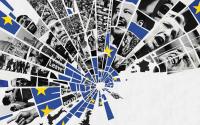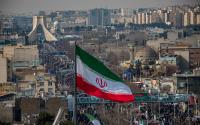Timothy Garton Ash October 3, 2002
Step forward Tony Gladstone. Meet Tony Churchill. Both were on stage in Blackpool this Tuesday, as the prime minister spoke about foreign policy. The question is: who leads whom? And what earthly chance do they have of realising their vast ambitions for Britain in the world?
Tony Gladstone preaches - never has the word been more apt - a moral imperative of global liberal engagement. Against Saddam. For Palestine as well as Israel. Against Aids, African poverty, disease and climate change. For rebuilding Afghanistan, and not just conquering it. "Remember," he says, "that the sanctity of life in the hill villages of Afghanistan, among the winter snows, is as inviolable in the eyes of Almighty God as can be your own". Well, actually that was William Ewart Gladstone. But, recast in the language of modern political televangelism, it's still the Blair message.
In some ways, he's more admirable than the original role model. When old William Ewart thundered against "the Bulgarian horrors", there was always the strong suspicion of political self-interest lurking behind those purple curtains of righteousness. The will of God and the career calculations of his earthly servant wonderfully coincided. By contrast, when Tony Blair talks war against the "Iraqi horrors", he is risking his own domestic political position. Moreover, Blair's arguments for humanitarian intervention and international community are more coherent and more sustained (if not more eloquent) than Gladstone's. To listen to him in a smaller group is to be convinced that he really is a passionate liberal interventionist.
I like and admire Tony Gladstone. I have not forgotten the touching graffiti I saw in downtown Pristina shortly after the liberation of Kosovo: "Thank you Tony Bler." But there is a huge problem here: the ambitions of Blair's moral global liberalism are far larger than old Gladstone's, but his means of realising them are so much smaller. When Gladstone inveighed against the Ottoman Bimbashis and Kaimakams, in 1878, Britain was what the United States is today - the hyperpower. Today, we're just Britain. "At times, in Britain we lack self-belief," Blair chided in Blackpool. We should remember that Britain has the fourth largest economy in the world, and so on. But if low self-esteem is something for national psychologists to watch out for, so is hubris.
In less visionary moments the prime minister knows very well that Britain is now a medium-sized European power. So we need to get larger forces to do our neo-Gladstonian work. This is where Tony Churchill comes in.
Of course all British prime ministers want to be Churchill. And someone who was a schoolboy in the 1960s grew up entirely in Churchill's shadow. But Churchill was not just the great war leader. Gnawed by the knowledge of Britain's sharply declining power, he made a strategic choice. This was to forge a special relationship with the United States, to help us do what we could no longer do on our own. And sure enough, in defending his close relationship with Washington, Blair recalled "where this alliance was forged: here in Europe, in world war II when Britain and America and every decent citizen in Europe joined forces to liberate Europe from the Nazi evil." (The only difference between this and what Margaret Thatcher would have said is the nice passing reference to decent citizens in Europe.)
So here we go again, in the old game of historical charades: Saddam = Hitler, Blair = Churchill, Bush = Roosevelt. But hang on, Roosevelt ? To make the comparison is to see the yawning differences. Actually, even Churchill found the game he invented difficult and sometimes humiliating to play. At one point in his dealings with Roosevelt, over financial support for the British war effort, Churchill exploded: "What do you want me to do - stand up and beg like Fala?" Fala was Roosevelt's dog.
Churchill fretted, with good reason, about Roosevelt cosying up to Stalin's Russia. "A small lion," he is recorded as saying, "was walking between a huge Russian bear and a great American elephant." Now the huge Russian bear has shrunk and grown mangy. But the British lion is even smaller than it was (although perhaps with better muscle-tone) and the American elephant is even larger. While Bill Clinton brilliantly played the part of Franklin Roosevelt at the Labour party conference yesterday, President George Bush has very different views of the new world order. It's not true that there's no Gladstonism in there. Actually, if you read the new American security doctrine, there's quite a lot. But there are also some very different voices: unilateralist, neo-imperialist, and, so to speak, Disraeli with F-16s.
Is there anything more a British prime minister can do to shift the balance inside the Bush administration? Probably not a lot. But how about paying a little more attention to the European voice? After all, both Gladstone and Churchill summoned the vision of "United Europe" to support their larger schemes. Europe has been remarkably absent from Blair's pronouncements on Iraq. There have been many references to conversations with Bush, but few or none to those with Chirac or Schröder, let alone Prodi and Solana.
He told parliament "we're working with the Americans and others" on a Middle East peace conference. Europe is reduced to "and others". In the conference speech, mentions were high-flown but perfunctory. "Europe is to become 25 nations, one Europe for the first time since Charlemagne," (two questionable claims in one sentence, incidentally). A brief plug for the euro. And then: "We believe in Europe but we're not yet at the centre of it." Dead right we're not. Nor, at this rate, shall we ever be.
It's true that Europe is in a mess over Iraq: Blair playing Churchill in Washington, Schröder playing Bismarck against Washington, Chirac playing hard-to-get and Brussels playing the mouth-organ. Europe has many positions on Iraq, and therefore none. One can understand the frustration. But it's rudimentary common sense that the small British lion would stand a slightly better chance of turning the American elephant if it had Europe - whatever animal or animals that is - pulling in something like the same direction. If I had been watching Tony Blair's performance from Paris or Berlin over the last two months, I would be wondering what on earth had happened to the professedly most pro-European of all British prime ministers. The man whose ambition it was (still is?) to resolve our historic uncertainty about our place in Europe, once and for all.
Blair rightly argues that there is no realistic alternative to engagement with America, whoever's running it. We can't just stand aside. Europe is not strong or united enough to act on its own. But his hair-raising wager seems to be that, with Britain's much diminished relative power, and not having the huge personal prestige of Churchill, he can still somehow "do a Churchill" and swing Bush's Washington behind a Gladstonian world agenda. It's some gamble. The danger is that Gladstone will get lost and Blair will end up as Churchill - without the clout.






